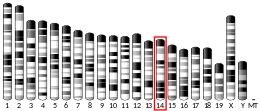FARP1
FERM, RhoGEF and pleckstrin domain-containing protein 1 is a protein that in humans is encoded by the FARP1 gene.[5][6]
This gene was originally isolated through subtractive hybridization due to its increased expression in differentiated chondrocytes versus dedifferentiated chondrocytes. The resulting protein contains a predicted ezrin-like domain, a Dbl homology domain, and a pleckstrin homology domain. It is believed to be a member of the band 4.1 superfamily whose members link the cytoskeleton to the cell membrane. Two alternatively spliced transcript variants encoding distinct isoforms have been found for this gene.[6]
References
- GRCh38: Ensembl release 89: ENSG00000152767 - Ensembl, May 2017
- GRCm38: Ensembl release 89: ENSMUSG00000025555 - Ensembl, May 2017
- "Human PubMed Reference:". National Center for Biotechnology Information, U.S. National Library of Medicine.
- "Mouse PubMed Reference:". National Center for Biotechnology Information, U.S. National Library of Medicine.
- Koyano Y, Kawamoto T, Shen M, Yan W, Noshiro M, Fujii K, Kato Y (Jan 1998). "Molecular cloning and characterization of CDEP, a novel human protein containing the ezrin-like domain of the band 4.1 superfamily and the Dbl homology domain of Rho guanine nucleotide exchange factors". Biochem Biophys Res Commun. 241 (2): 369–75. doi:10.1006/bbrc.1997.7826. PMID 9425278.
- "Entrez Gene: FARP1 FERM, RhoGEF (ARHGEF) and pleckstrin domain protein 1 (chondrocyte-derived)".
Further reading
- Zhuang B, Su YS, Sockanathan S (February 2009). "FARP1 promotes the dendritic growth of spinal motor neuron subtypes through transmembrane Semaphorin6A and PlexinA4 signaling". Neuron. 61 (3): 359–72. doi:10.1016/j.neuron.2008.12.022. PMC 2654783. PMID 19217374.
- Hartley JL, Temple GF, Brasch MA (2001). "DNA cloning using in vitro site-specific recombination". Genome Res. 10 (11): 1788–95. doi:10.1101/gr.143000. PMC 310948. PMID 11076863.
- Strausberg RL, Feingold EA, Grouse LH, et al. (2003). "Generation and initial analysis of more than 15,000 full-length human and mouse cDNA sequences". Proc. Natl. Acad. Sci. U.S.A. 99 (26): 16899–903. doi:10.1073/pnas.242603899. PMC 139241. PMID 12477932.
- Ota T, Suzuki Y, Nishikawa T, et al. (2004). "Complete sequencing and characterization of 21,243 full-length human cDNAs". Nat. Genet. 36 (1): 40–5. doi:10.1038/ng1285. PMID 14702039.
- Dunham A, Matthews LH, Burton J, et al. (2004). "The DNA sequence and analysis of human chromosome 13". Nature. 428 (6982): 522–8. doi:10.1038/nature02379. PMC 2665288. PMID 15057823.
- Gerhard DS, Wagner L, Feingold EA, et al. (2004). "The status, quality, and expansion of the NIH full-length cDNA project: the Mammalian Gene Collection (MGC)". Genome Res. 14 (10B): 2121–7. doi:10.1101/gr.2596504. PMC 528928. PMID 15489334.
- Wiemann S, Arlt D, Huber W, et al. (2004). "From ORFeome to biology: a functional genomics pipeline". Genome Res. 14 (10B): 2136–44. doi:10.1101/gr.2576704. PMC 528930. PMID 15489336.
- Mehrle A, Rosenfelder H, Schupp I, et al. (2006). "The LIFEdb database in 2006". Nucleic Acids Res. 34 (Database issue): D415–8. doi:10.1093/nar/gkj139. PMC 1347501. PMID 16381901.
External links
- FARP1 human gene location in the UCSC Genome Browser.
- FARP1 human gene details in the UCSC Genome Browser.
This article is issued from Wikipedia. The text is licensed under Creative Commons - Attribution - Sharealike. Additional terms may apply for the media files.




